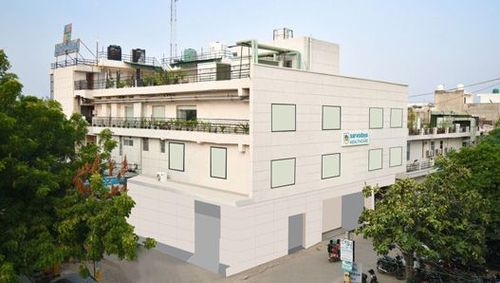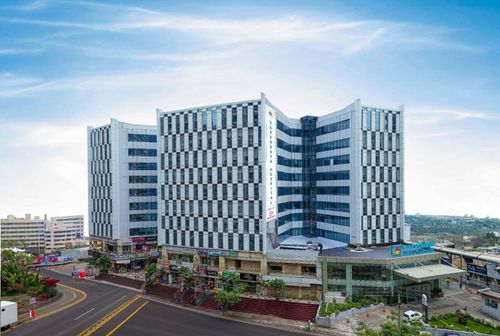Overview
A kidney infection, also called pyelonephritis, is a serious urinary tract infection (UTI) that begins in the bladder or urethra and spreads to one or both kidneys. If left untreated, it can cause permanent kidney damage or lead to life-threatening complications if bacteria enter the bloodstream. Common signs may include fever, back pain, nausea, or painful urination.
At Sarvodaya’s Centre for Nephrology, we provide advanced kidney infection treatment in Faridabad through accurate diagnosis, effective antibiotic therapy, and specialist-led care, ensuring safe recovery and long-term kidney health.
Kidney Infections Symptoms
- Persistent Pain in the Back, Side, or Groin
- High Fever and Chills
- Frequent and Urgent Need to Urinate
- Burning Sensation or Pain During Urination
- Cloudy or Foul-Smelling Urine
- Presence of Blood in Urine (Hematuria)
- Nausea or Vomiting
- Fatigue and General Weakness
- Confusion (More Common in Older Adults)
Causes of Kidney Infections
- Bacterial infection (commonly coli) spreading from the urinary tract to the kidneys
- Untreated urinary tract infections (UTIs) that progress upward
- Blockages in the urinary tract, such as kidney stones or an enlarged prostate
- Weakened immune system makes the body more prone to infections
- Vesicoureteral reflux (VUR), a condition where urine flows backwards from the bladder to the kidneys
- Use of urinary catheters, which can introduce bacteria
- Sexual activity in women increases the risk of bacterial spread
- Certain medical conditions, like diabetes, increase susceptibility to infections
Diagnosis of Kidney Infections
Accurate diagnosis is essential to confirm kidney infections and avoid long-term complications. At Sarvodaya, our team of kidney specialist doctors use clinical assessment and advanced tests for precision.
- Urine Analysis – A laboratory test that detects bacteria, pus cells, or blood traces in urine, confirming the presence of infection and guiding further diagnostic investigations.
- Urine Culture – Identifies the specific bacteria causing the infection, enabling doctors to prescribe the most effective antibiotic therapy for targeted and faster recovery.
- Blood Tests – Evaluate kidney function, measure infection markers, and confirm whether the infection has entered the bloodstream, signalling complications needing urgent medical intervention.
- Ultrasound of Kidneys – A safe imaging test used to detect stones, blockages, or structural abnormalities that might predispose patients to recurrent kidney infections.
- CT Scan – Advanced imaging providing detailed views of the kidneys and urinary tract, essential in complex or recurrent cases to detect hidden causes or complications.
Treatment Options & Technology for Kidney Infections
- Antibiotic Therapy – First-line treatment uses oral or intravenous antibiotics to eliminate bacterial infection, customised to patient's needs based on culture results and severity of illness.
- Hospitalisation for Severe Cases – Patients may require admission with intravenous antibiotics, fluids, and monitoring, particularly if infection spreads or complicates existing health conditions.
- Pain Management Medications – Prescribed medicines help relieve discomfort, fever, or flank pain associated with kidney infection, improving comfort while primary antibiotic therapy treats the underlying cause.
- Treatment of Underlying Causes – Managing kidney stones, enlarged prostate, or urinary blockages helps prevent recurrent infections and ensures more effective, long-lasting treatment outcomes.
- Surgical Intervention (if Needed) – In cases of obstruction or structural abnormality, surgical correction restores urinary flow, reduces infection risk, and supports long-term kidney preservation.
Prevention & Lifestyle Modifications for Kidney Infections
Consulting the best nephrologist in Delhi NCR can further help in getting timely advice, preventive care, and personalised treatment for long-term kidney health.
- Stay Well-Hydrated – Drinking 8–10 glasses of water daily helps flush out bacteria from the urinary tract, reducing infection risk and supporting overall kidney health.
- Do Not Delay Urination – Emptying the bladder regularly prevents bacterial growth, lowers urinary tract pressure, and significantly decreases chances of infection developing or recurring.
- Practice Good Personal Hygiene – Proper cleaning after using the toilet reduces bacterial spread, protecting the urinary tract and preventing germs from entering the bladder.
- Urinate After Sexual Activity – Passing urine after intercourse helps flush away bacteria from the urethra, lowering infection risk and keeping urinary passages clear.
- Avoid Excessive Use of Irritants – Perfumed soaps, sprays, or harsh cleansers disrupt natural pH, irritate tissues, and increase vulnerability to urinary tract and kidney infections.
- Wear Breathable Cotton Underwear – Cotton fabric allows airflow, prevents moisture build-up, and reduces bacterial growth, keeping the genital area dry and lowering infection chances.
Pre and Post Surgery for Kidney Infections
Pre-Treatment / Pre-Surgery Modifications:
- Complete all required urine and blood tests as advised by the doctor
- Stay well-hydrated to support kidney function
- Avoid self-medication with antibiotics before consultation
- Inform your doctor about any ongoing medications or chronic conditions
- Follow dietary advice (if kidney stones or blockages are suspected)
Post-Treatment / Post-Surgery Modifications:
- Complete the full course of antibiotics as prescribed
- Drink adequate water to flush out bacteria and prevent recurrence
- Avoid alcohol and smoking during recovery
- Follow a kidney-friendly diet, limiting excess salt and processed foods
- Maintain proper hygiene to prevent reinfection
- Attend regular follow-ups for urine and kidney function monitoring







